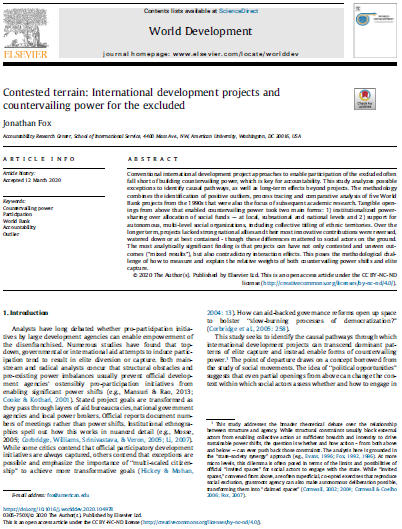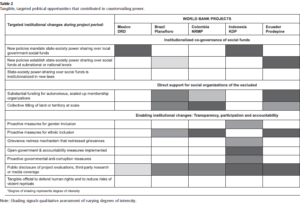
Contested terrain: International development projects and countervailing power for the excluded
Date: September 2020
Author(s): Jonathan Fox
Publication type: Scholarly Journal Article
Published by: World Development
Conventional international development project approaches to enable participation of the excluded often fall short of building countervailing power, which is key for accountability. This study analyzes possible exceptions to identify causal pathways, as well as long-term effects beyond projects. The methodology combines the identification of positive outliers, process tracing and comparative analysis of five World Bank projects from the 1990s that were also the focus of subsequent academic research. Tangible openings from above that enabled countervailing power took two main forms: 1) institutionalized powersharing over allocation of social funds — at local, subnational and national levels and 2) support for autonomous, multi-level social organizations, including collective titling of ethnic territories. Over the longer term, projects lacked strong national allies and their most innovative contributions were reversed, watered down or at best contained – though these differences mattered to social actors on the ground. The most analytically significant finding is that projects can have not only contested and uneven outcomes (‘‘mixed results”), but also contradictory interaction effects. This poses the methodological challenge of how to measure and explain the relative weights of both countervailing power shifts and elite capture.

Jonathan Fox Jonathan Fox is a Professor in the School of International Service at American University and Director of ARC. His books include Accountability Politics: Power and Voice in Rural Mexico (Oxford 2007) and Mexico’s Right-to-Know Reforms: Civil Society Perspectives (co-editor, Fundar/Wilson Center 2007). He collaborates with a wide range of public interest groups, social organizations and policymakers and currently serves on the boards of directors of Fundar (Mexico), the Bank Information Center (Washington DC), and the Community Agroecology Network (Santa Cruz). For online publications, see http://jonathan-fox.org/.
